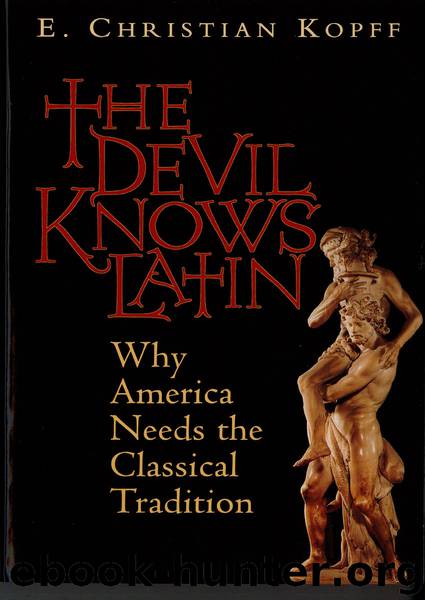Devil Knows Latin by E. Christian Kopff

Author:E. Christian Kopff
Language: eng
Format: epub, mobi
ISBN: 9781497651616
Publisher: Intercollegiate Studies Institute
Chapter XV
J. R.R.TOLKIEN: INVENTING LOST WORLDS
The American tourists were visiting Rome for the first time and asked the owner of their pensione what to see. He urged them not to miss the Roman Forum. When they returned for lunch, they were quiet and grim mouthed. Finally, he asked them why, and the man burst out, “We never dreamed that you Italians were such chauvinists. We ask a polite question in good faith and you send us to some place we bombed during the war.” It is sometimes hard for the reader of the daily newspapers to remember that there are ruins not created by the 20th century. Among the ancient wrecks tourists visit is the doctus poeta, as the Romans called him, the scholar-poet; unlike the ruins he haunted, however, he really is a victim of this century. Virgil, Dante, Milton, and Tasso have no successors as the twentieth century draws to a close. Today’s universities may provide refuge for a few poets and token “creative writers,” but in general the university in the West cannot comprehend, let alone foster, the humane ideal of the doctus poeta.
Scholar-poets have indeed existed in this century, but they have been largely misunderstood. A. E. Housman is a good example. Recent years have seen several well-received biographies, each of which concentrates on the few months of his writing poetry and his pitiable love life. Housman’s many volumes of scholarly work, which rescued English classical studies from provincialism and mediocrity, are viewed as a parergon, something to fill in the years. The tone was set by Edmund Wilson, who sneered at Housman’s scholarship; you see, Housman edited the Silver Latin poets, Juvenal and Lucan, and refused to publish his edition of the Augustan love poet, Propertius. What Wilson did not understand is the centrality of Juvenal the Satirist for modern culture and the importance of Lucan and Roman libertas for contemporary freedom.
Wilson also had his innings at J. R. R. Tolkien, another of this century’s scholar-poets. Wilson the literary critic read in the publisher’s press release that the professor of English and former professor of Anglo-Saxon had located the origins of The Lord of the Rings in his “secret vice” of inventing languages—languages which then needed a mythology and history in which to grow and develop like historical languages. Wilson was aghast. A narrative that grew from a desire to root an invented language in story and folklore—how could the tale ever be more than “a philological curiosity.”
We do soon tire of the complicated narrative and highfalutin language used in the stories that lie behind The Lord of the Rings and long for the company of Frodo and Sam Gamgee. It is as if we had picked up a book in our motel room, expecting to enjoy the vigorous dialogue of St. John’s Gospel, only to find ourselves wandering with the children of Nephi through the Book of Mormon. But say not the labour naught availeth. The Lost Tales and The Silmarillion gave to The Lord of the Rings its depth of concreteness in language and history.
Download
This site does not store any files on its server. We only index and link to content provided by other sites. Please contact the content providers to delete copyright contents if any and email us, we'll remove relevant links or contents immediately.
Housekeeping by Marilynne Robinson(4434)
Papillon (English) by Henri Charrière(4251)
The Poetry of Pablo Neruda by Pablo Neruda(4089)
World without end by Ken Follett(3472)
TCP IP by Todd Lammle(3177)
Fluent Forever: How to Learn Any Language Fast and Never Forget It by Gabriel Wyner(3076)
The Rape Of Nanking by Iris Chang(2809)
How Proust Can Change Your Life by Alain De Botton(2800)
The Alchemist by Paulo Coelho(2684)
The Partner by John Grisham(2394)
Two lives by Helen Naylor(2296)
Hitler by Ian Kershaw(2193)
Yerma by Federico García Lorca(2062)
Sophie's World by Jostein Gaarder(2013)
Smilla's Sense of Snow by Peter Hoeg(1930)
Merriam-Webster's Pocket Dictionary by Merriam-Webster(1929)
Twilight of Idols and Anti-Christ by Friedrich Nietzsche(1888)
Il cavaliere inesistente by Italo Calvino(1852)
Deep Writing by Eric Maisel(1814)
